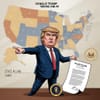A draft executive order under consideration by President Donald Trump, titled “Eliminating State Law Obstruction of National AI Policy,” would significantly centralise AI regulation at the federal level. According to WIRED, the order proposes setting up an “AI Litigation Task Force” within the Justice Department to sue states whose AI laws are deemed to infringe on federal constitutional rights — for example, free speech or interstate commerce.
The plan explicitly targets state AI laws in places like California and Colorado, which require transparency reports from AI developers about how their models are trained. These regulations are described in the draft as an “onerous patchwork” that hinders innovation, a view backed by Big Tech groups including Google, OpenAI, and venture-capital firms.
To enforce its demands, the order would also empower the Commerce Department to review such state AI laws and potentially deny those states federal broadband funding (via programmes like BEAD), if their AI regulations don’t align with the federal vision. In parallel, Trump’s advisors, including David Sacks (Special Adviser for AI and Crypto), would draft a uniform federal regulatory framework for AI — one that, in the administration’s view, would override conflicting state legislation.
Critics, however, warn that the proposed order could undermine public trust in AI regulation. Civil liberties advocates argue that it erodes state autonomy, and some legal experts contend it might exceed presidential authority by conditioning federal funds on states’ policy choices.


